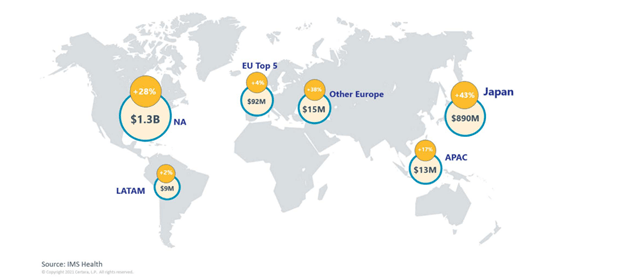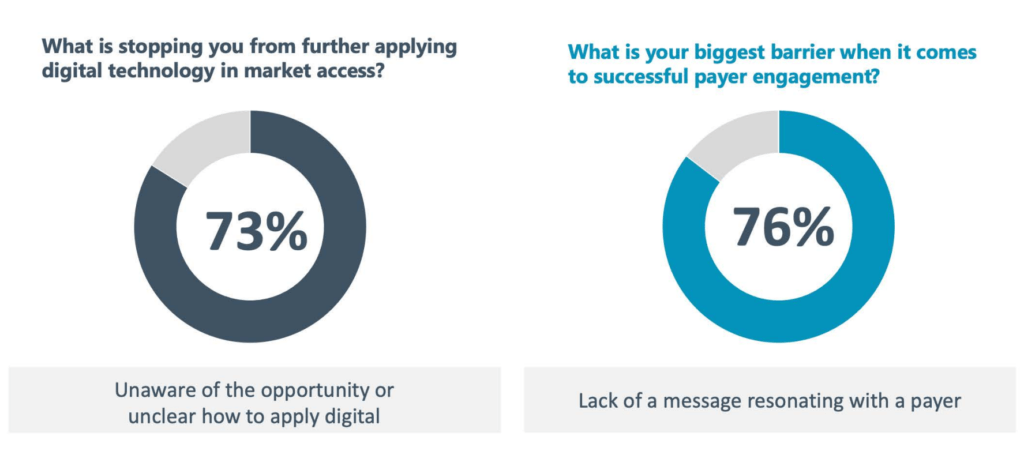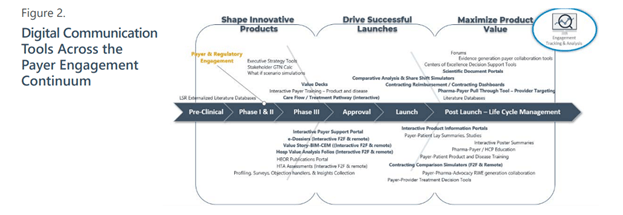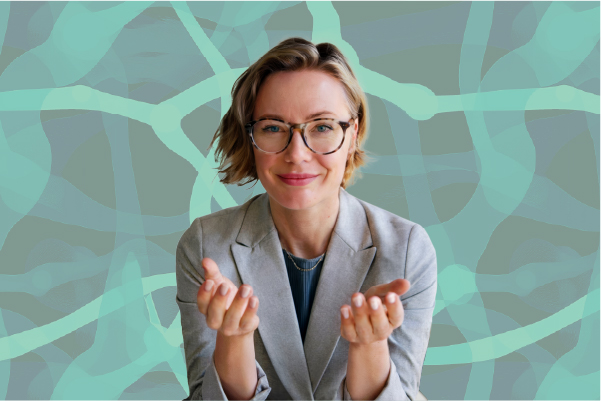When you look at the global pharmaceutical market overall (Figure 1), North America is at the forefront of payer digital engagement, spending $1.3 billion per year with a growth rate of 28%, followed by Japan at $890 million and a growth rate of 43%, and the top five EU countries combined at $92 million with a combined growth rate of 4%.1

Even though there is about a 32% increase in global digital channel investment overall, that equates to only about $2.3 billion of the $71 billion total promotional spend worldwide. Furthermore, 80% of that pharma spend is on prescriber sales and marketing and less than 7% of it is on payers directly.2
What does this pattern of payer digital engagement mean?
The rest of the world is still focused predominantly on traditional promotional channels with little digital share and multi-channel sophistication. This is especially true as it pertains to payer engagement and even more so for local payer engagement. This is where engaging digital content can substantially impact the decision making of local payers, particularly in “white space” where many local payers find themselves due to pharma or biotech manufacturer resource limitations.
Barriers to digital engagement with payers
What deters pharmaceutical companies from applying digital technology to market access? An eyeforpharma survey revealed that 73% of respondents were unaware of the opportunity or unclear how to apply digital technology.2 When asked about their biggest barrier to successful payer engagement, 76% of them responded that it was the lack of a message that resonated with the payer.2 This finding underscores the importance of having tailored and refined messages for local, regional, and national payers’ needs, challenges, and unique patient populations.

But payers are open to digital engagement. Research has shown that 74% of payers want to work with pharmaceutical companies to improve outcomes, and 52% of them believe interactive content makes meetings more valuable.3
This is especially important from a remote engagement perspective because payers spend three hours out of their eight-hour workday using digital resources.4
In addition, 83% of U.S. hospitals, 74% of pharmacy benefit managers, and 95% of payer formulary decision makers (FDMs) rely on digital resources for their committee work and decisions.5 In fact, the average FDM spends four times as much time online during their workday than the average physician.5
How pharmaceutical companies can engage payers digitally
Many untapped opportunities exist to digitally engage with payers globally using both face-to-face (either in person or via teleconference) and interactive remote engagement tools. Pharmaceutical companies can use interactive digital content to create a collaborative experience, and deliver clearer, simpler messaging, and tailored value statements. The key is to closely track the resulting analytics to target messages better and more closely reflect a product’s impact on payers’ specific patient populations.
Interactive digital engagement also provides significant opportunities to increase remote payer contact. This is especially important for companies with smaller market access and health economics and outcomes research (HEOR) field teams.
To determine how well these strategies are working, pharmaceutical companies need a platform and applications that allow them to see what the payer is looking at and what data they are interacting with. They need to go beyond just tracking PDF downloads and the time a payer spent on specific web pages. Pharma companies should investigate how payers are interacting with different datasets to determine the impact of their tools and messages.
Payer engagements are high stakes.
Pharma and biotech companies need digital content that permits them to interact with the payer in a customized fashion to maximize the potential for success and ROI.
Local payers can be engaged remotely through emails, social media, and LinkedIn. However, the most profound engagement is through customized workspaces that can be tiered for different payer segments and provide value dossiers, insights, surveys, and educational and scientific materials. By providing a forum for two-way communication and collaboration, these workspaces generate analytics that show how messages resonate and provide an opportunity to increase their impact. For example, a heatmap on each data slide or page will show where payers are spending their time. In addition, built in direct feedback mechanisms will help to determine whether the data are having the desired result.
Choosing the right digital communication tools
Many different digital communication tools can be used to engage payers at different stages in a product’s lifecycle (see Figure 2). Initially, these include interactive value decks, care flow (how patients are cared for and treated), and treatment pathway tools, which usually contain the health economics and outcomes research repositories. Later in the product lifecycle, there is greater use of scientific document portals, comparative analysis and share shift simulators, which can show the impact of shifting patients from one drug to another, and contract reimbursement and contracting dashboards. Interactive product information portals and contract comparison simulators can also be employed to communicate why one type of contract might be more advantageous to a payer than another.

Conclusion
Digital tools can convey product value to payers in an accessible, interactive, and impactful manner. When in-person interactions are limited, interactive digital engagement can help establish relationships and build acceptance for new products.
Does your biopharmaceutical organization need a digital platform for communicating the value of your product to payers? Check out Basecase, the fastest way to create and deploy stakeholder engagement content!
BaseCase Value Communications Software
References
1. IMS Health
2. Eyeforpharma, 2018
3. DRG Digital, 2017
4. Eyeforpharma, 2018
5. DRG and Manhattan Research


